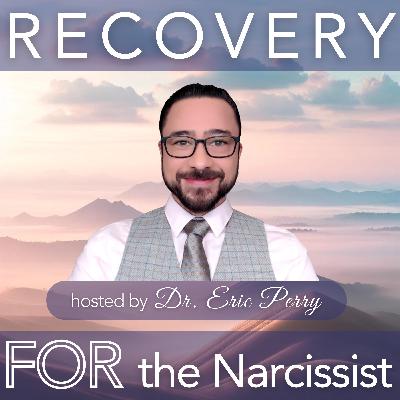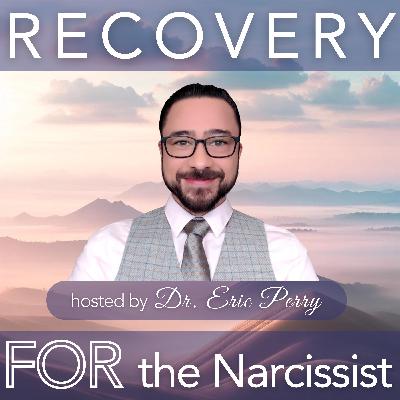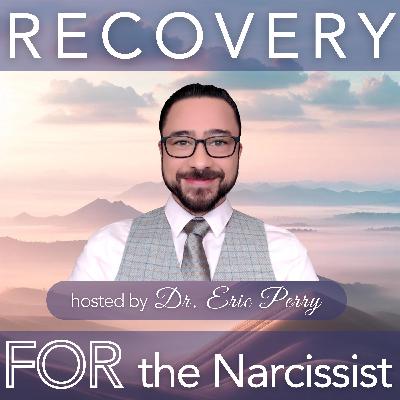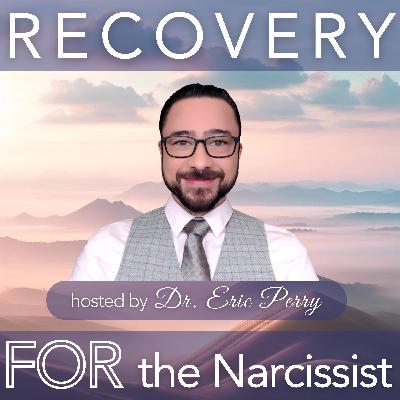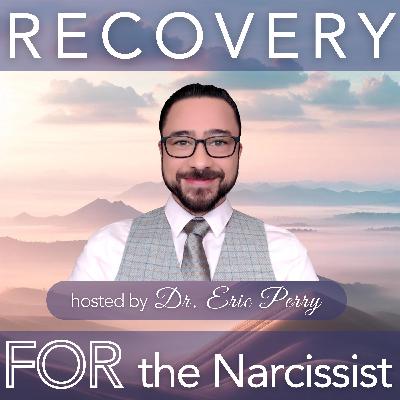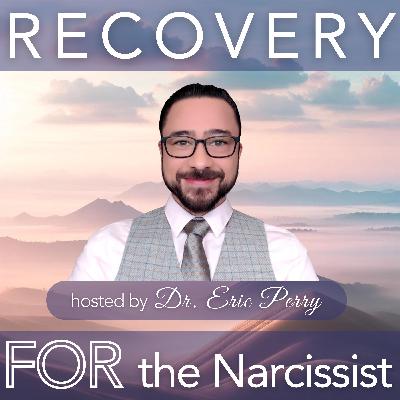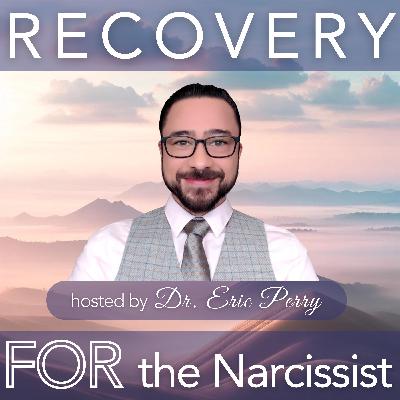Discover Recovery FOR the Narcissist | Narcissism
Recovery FOR the Narcissist | Narcissism

Recovery FOR the Narcissist | Narcissism
Author: Dr. Eric Perry, PhD
Subscribed: 102Played: 2,502Subscribe
Share
© Dr. Eric Perry, PhD
Description
Hosted by Dr. Eric Perry, this podcast offers insights, support, and encouragement for individuals with narcissistic tendencies. Dr. Perry examines how these tendencies influence behavior, impact relationships, and offers practical self-improvement strategies. He aims to help listeners break negative patterns and live more meaningful, empathic, and fulfilling lives.
Connect with Dr. Perry:
https://drericperry.com
Own Your Stuff Coaching Group:
https://drericperry.com/ownyourstuff
Empathy Awakening Workshop
https://drericperry.com/empathyawakening
Connect with Dr. Perry:
https://drericperry.com
Own Your Stuff Coaching Group:
https://drericperry.com/ownyourstuff
Empathy Awakening Workshop
https://drericperry.com/empathyawakening
99 Episodes
Reverse
In this episode of Recovery for the Narcissist, Dr. Eric Perry explores the hidden emotional engine beneath narcissistic defenses: self-loathing. This episode examines how deep internal shame, formed early in life and carried silently into adulthood, shapes emotional reactions, relational patterns, and the need to maintain a polished exterior at all times.Dr. Perry explains how this inner narrative—the quiet belief of not being enough—leads many individuals with narcissistic traits to perform strength rather than inhabit authenticity. He explores how self-loathing fuels perfectionism, emotional guardedness, and an intense fear of being truly known, while simultaneously creating a painful hunger for real closeness.Listeners will learn about:How the false self forms as a protective performanceThe role of shame in shaping narcissistic identityThe hidden emotional cost of maintaining the maskHow self-loathing interferes with vulnerability and attachmentFive pathways toward healing through honesty and compassionate self-contactDr. Perry offers a deeply humane perspective for those who have felt the exhausting burden of performing competence, confidence, or superiority while privately fighting feelings of unworthiness. Whether you have struggled to let others in or have pushed away love out of fear rather than indifference, this episode gives language and clarity to an emotional experience that rarely gets acknowledged out loud.Tune in to discover how gentleness, patience, and emotional presence can slowly restore the connection between the self you show to the world and the self you’ve learned to hide. Healing begins not with perfection, but with allowing yourself to be seen—imperfectly, authentically, and without the armor of performance.Connect with Dr. Perry: https://drericperry.comOwn Your Stuff Online Coaching Group: https://drericperry.com/ownyourstuffEmpathy Awakening Workshop: https://drericperry.com/empathyawakeningDisclaimer: The content contained in this podcast is for general information only and is not intended to be a substitute for professional advice, assessment, diagnosis, or treatment. Listeners should not rely on the information provided for their own health needs. All specific questions should be presented to your own healthcare provider. Listening to this podcast in no way creates a professional/working relationship between the listener and the host. If at any time you have an emergency while listening, please contact your local emergency center immediately.
In this episode of Recovery for the Narcissist, Dr. Eric Perry explores the delicate, often misunderstood moment that follows an interpersonal disconnect. This episode examines how micro-ruptures—those subtle moments when a tone shifts, a comment lands poorly, or a sense of distance quietly appears—can profoundly impact emotional safety long before anything is acknowledged out loud.Dr. Perry unpacks why these moments are uniquely challenging for individuals with narcissistic tendencies. He explains how discomfort, shame, and the loss of emotional control can activate defensive strategies that feel instinctive in the moment but ultimately undermine trust and connection. Instead of regulating internally, many unconsciously reach for overt defense, covert defense, or premature repair—attempts to ease their own discomfort rather than meet the relational moment with presence.Listeners will learn about: What micro-ruptures look like in real-life dynamics Why narcissistic individuals often rush to repair in order to regain emotional control The difference between emotional urgency and emotional responsibility How premature repair protects comfort but blocks connection Five essential practices for meaningful reconnectionDr. Perry offers clear and compassionate insight for anyone who has felt the sting of a subtle disconnect—or for those who may unintentionally respond to these moments with speed rather than attunement. Whether you’ve sensed emotional distance growing without understanding why, or you’ve noticed your own instinct to “fix things” too quickly, this episode brings clarity, language, and a framework for authentic repair.Tune in to discover how slowing down, staying present, and tolerating discomfort can transform a disconnect from a moment of emotional rupture into an opportunity for genuine reconnection. Healing in relationships begins not with perfection, but with presence, responsibility, and the choice to rebuild emotional safety one moment at a time.Connect with Dr. Perry: https://drericperry.comOwn Your Stuff Online Coaching Group: https://drericperry.com/ownyourstuffEmpathy Awakening Workshop: https://drericperry.com/empathyawakeningDisclaimer: The content contained in this podcast is for general information only and is not intended to be a substitute for professional advice, assessment, diagnosis, or treatment. Listeners should not rely on the information provided for their own health needs. All specific questions should be presented to your own healthcare provider. Listening to this podcast in no way creates a professional/working relationship between the listener and the host. If at any time you have an emergency while listening, please contact your local emergency center immediately.
In this episode of Recovery for the Narcissist, Dr. Eric Perry explores the subtle but powerful impact of frustration leaks in narcissistic relationships. This episode explores how unspoken emotional distress—expressed through sighs, muttering, or tension-filled body language—can quietly alter the emotional safety of a relationship without a single word being said.Dr. Perry unpacks the psychological mechanics of frustration leaks, highlighting how this behavior often reflects a deeper struggle with emotional regulation and vulnerability. He explains why individuals with narcissistic tendencies may externalize distress in indirect ways—and how those around them are left to absorb the emotional weight of what goes unspoken.Listeners will learn about: What frustration leaks look like in real-life dynamics Why narcissistic individuals often externalize emotional distress unconsciously The difference between self-regulation and emotional outsourcing How subtle expressions of frustration can create emotional pressure and distance Practical tools to contain emotion, name impact, and rebuild emotional safetyDr. Perry offers clear and compassionate insight for both those who have experienced the tension of frustration leaks and those who may be unintentionally creating it. Whether you have noticed a growing emotional distance in your relationship or felt the weight of someone else’s mood without understanding why, this episode provides language, clarity, and a path toward change.Tune in to discover how frustration—when acknowledged rather than leaked—can become a moment of honest connection rather than quiet rupture. Healing begins not with denial or perfection, but with presence, ownership, and the choice to create emotional safety, one moment at a time.Connect with Dr. Perry: https://drericperry.comOwn Your Stuff Online Coaching Group: https://drericperry.com/ownyourstuffEmpathy Awakening Workshop: https://drericperry.com/empathyawakeningDisclaimer: The content contained in this podcast is for general information only and is not intended to be a substitute for professional advice, assessment, diagnosis, or treatment. Listeners should not rely on the information provided for their own health needs. All specific questions should be presented to your own healthcare provider. Listening to this podcast in no way creates a professional/working relationship between the listener and the host. If at any time you have an emergency while listening, please contact your local emergency center immediately.
In this episode of Recovery for the Narcissist, Dr. Eric Perry explores the quiet yet deeply damaging experience of emotional invalidation in narcissistic relationships. This episode examines how subtle forms of dismissal, deflection, and emotional withdrawal can slowly erode a partner’s sense of self—leaving them feeling confused, unseen, and emotionally alone.Dr. Perry unpacks the psychological mechanics of emotional invalidation, highlighting how it often masquerades as logic, reason, or even care. He explains why individuals with narcissistic tendencies struggle to tolerate emotional vulnerability—and how their attempts to manage discomfort often result in silencing the people closest to them.Listeners will learn about: What emotional invalidation looks like in real-life dynamics Why narcissistic individuals often use invalidation—consciously or unconsciously The difference between healthy disagreement and emotional dismissal How chronic invalidation distorts emotional reality and damages trust Practical ways to identify invalidation and begin rebuilding emotional safetyDr. Perry offers clear and compassionate insight for both those who have experienced emotional invalidation and those who may be unintentionally causing it. Whether you’ve found yourself walking on eggshells or noticing a growing emotional distance in your relationship, this episode provides language, clarity, and hope.Tune in to discover how emotional validation—simple acts of presence, witnessing, and non-defensive listening—can transform a relationship from emotionally unsafe to emotionally connected. Healing begins not with control or correction, but with the courage to truly hear and be heard.Connect with Dr. Perry: https://drericperry.comOwn Your Stuff Online Coaching Group: https://drericperry.com/ownyourstuffEmpathy Awakening Workshop: https://drericperry.com/empathyawakeningDisclaimer: The content contained in this podcast is for general information only and is not intended to be a substitute for professional advice, assessment, diagnosis, or treatment. Listeners should not rely on the information provided for their own health needs. All specific questions should be presented to your own healthcare provider. Listening to this podcast in no way creates a professional/working relationship between the listener and the host. If at any time you have an emergency while listening, please contact your local emergency center immediately.
In this episode of Recovery for the Narcissist, Dr. Eric Perry explores the complex and often misunderstood phenomenon of mirroring in narcissistic relationships. This episode dives into how mirroring can create the illusion of deep connection—while quietly eroding authenticity, trust, and emotional intimacy.Dr. Perry unpacks the psychological roots of mirroring, tracing it from early childhood development to its manipulative adaptation in adulthood. He explains how individuals with narcissistic tendencies often use mirroring—consciously or unconsciously—as a way to build connection, avoid rejection, and emotionally survive within relationships.Listeners will learn about: The origins of mirroring and how it forms in childhood How narcissistic individuals use mirroring to create rapid emotional closeness Why mirroring feels like connection at first—but leads to disconnection over time The emotional toll of being mirrored instead of truly seen Practical steps to recognize mirroring patterns and rebuild real, honest connectionDr. Perry offers clear and compassionate guidance for those who find themselves stuck in cycles of performative connection. Whether you have used mirroring to feel accepted or have been on the receiving end of it, this episode provides insight, validation, and a path forward.Tune in to discover how moving from imitation to authenticity can heal your relationships—from shallow and performative to grounded and real. Through honest self-reflection and small acts of vulnerability, true intimacy becomes possible—not by becoming who someone wants you to be, but by becoming more fully yourself.Connect with Dr. Perry: https://drericperry.comOwn Your Stuff Online Coaching Group: https://drericperry.com/ownyourstuffEmpathy Awakening Workshop: https://drericperry.com/empathyawakeningDisclaimer: The content contained in this podcast is for general information only and is not intended to be a substitute for professional advice, assessment, diagnosis, or treatment. Listeners should not rely on the information provided for their own health needs. All specific questions should be presented to your own healthcare provider. Listening to this podcast in no way creates a professional/working relationship between the listener and the host. If at any time you have an emergency while listening, please contact your local emergency center immediately.
In this episode of Recovery for the Narcissist, Dr. Eric Perry explores the powerful and often unnoticed phenomenon of emotional contagion—the unconscious transfer of emotions from one person to another. This episode examines how intense emotional energy can quietly move between people, disrupting connection, creating emotional overwhelm, and shaping the dynamic of a relationship—often without anyone realizing it.Dr. Perry breaks down the neuroscience and psychology behind emotional contagion, including the role of mirror neurons and the tendency to absorb others' emotional states. He explains how individuals with narcissistic traits may struggle with emotional regulation and unintentionally trigger emotional contagion through unfiltered emotional expression or emotional dumping.Listeners will learn about:The science of emotional contagion and how it plays out in everyday relationshipsHow emotional dumping creates imbalance and emotional fatigue in close relationshipsThe difference between healthy emotional sharing and reactive offloadingWhy emotional safety must be mutual—not one-sidedPractical strategies to build emotional resilience and self-soothing skillsDr. Perry offers clear and compassionate guidance on recognizing these emotional patterns, cultivating self-awareness, and shifting from emotional reactivity to relational accountability.Tune in to understand how emotional responsibility can transform your connections—from chaotic and one-sided to calm, grounded, and reciprocal. Through reflection, intention, and small moments of self-regulation, emotional maturity becomes not just possible—but profoundly healing.Connect with Dr. Perry: https://drericperry.comOwn Your Stuff Online Coaching Group: https://drericperry.com/ownyourstuffEmpathy Awakening Workshop: https://drericperry.com/empathyawakeningDisclaimer: The content contained in this podcast is for general information only and is not intended to be a substitute for professional advice, assessment, diagnosis, or treatment. Listeners should not rely on the information provided for their own health needs. All specific questions should be presented to your own healthcare provider. Listening to this podcast in no way creates a professional/working relationship between the listener and the host. If at any time you have an emergency while listening, please contact your local emergency center immediately.
In this episode of Recovery for the Narcissist, Dr. Eric Perry explores the hidden impact of reactive communication in relationships. Often driven by intense emotions like anger, fear, or shame, reactive communication can quietly erode trust and connection, leaving a trail of unresolved tension and emotional distance. Dr. Perry guides listeners through the roots of this pattern, helping them understand how impulsive reactions can become ingrained coping strategies—especially for individuals with narcissistic tendencies.Listeners will learn what reactive communication looks like, how it develops, and the deeper emotional and relational damage it can cause over time. Through vivid examples and compassionate insight, the episode explores how these communication habits form, the role of emotional triggers and past experiences, and how they can lead to repeated conflict and feelings of disconnect.Dr. Perry provides actionable strategies to break free from these unhealthy cycles and cultivate more responsive, thoughtful interactions. Key takeaways include:Recognizing the emotional triggers and automatic reactions that lead to reactive communicationTechniques for creating space between a trigger and your responsePractical strategies for emotional transparency and choosing thoughtful language in moments of stressIn this episode, Dr. Perry will also examine how reactive communication can manifest more subtly—through passive-aggressiveness, mood shifts, or emotional withdrawal—and how these behaviors can lead to confusion, resentment, and trauma bonding. He sheds light on the emotional toll of navigating unpredictable communication, especially within narcissistic dynamics.Tune in to gain valuable insights into transforming reactive habits into responsive communication styles that foster trust, understanding, and connection. Dr. Perry’s guidance offers a path toward emotional regulation and relational safety, empowering listeners to show up more intentionally in their relationships and within themselves.Connect with Dr. Perry: https://drericperry.comOwn Your Stuff Online Coaching Group: https://drericperry.com/ownyourstuffEmpathy Awakening Workshop: https://drericperry.com/empathyawakeningDisclaimer: The content contained in this podcast is for general information only and is not intended to be a substitute for professional advice, assessment, diagnosis, or treatment. Listeners should not rely on the information provided for their own health needs. All specific questions should be presented to your own healthcare provider. Listening to this podcast in no way creates a professional/working relationship between the listener and the host. If at any time you have an emergency while listening, please contact your local emergency center immediately.
In this episode of Recovery for the Narcissist, Dr. Eric Perry explores the complex world of trauma bonds within relationships. Often mistaken for deep connections, trauma bonds can form some of the most challenging emotional patterns to identify and break. Dr. Perry guides listeners through the psychology of trauma bonding, introduced by Dr. Patrick Carnes, which illuminates the dynamic interplay of fear, excitement, and emotional manipulation in maintaining these bonds.
Listeners will learn about the stages of trauma bonding, from idealization and love bombing to conflict and reconciliation, and how these cycles forge deep, yet unhealthy, emotional attachments. The episode will also examine subtle manifestations of trauma bonding, such as the interplay between criticism and validation and the role of isolation in reinforcing emotional dependencies.
Dr. Perry provides actionable strategies to recognize and disrupt these patterns, paving the way for healthier, more authentic relationships. Key takeaways include:
Recognizing the subtle signs of trauma bonding in everyday interactions.
Strategies for setting healthy boundaries and improving communication.
Practical tips for self-care and prioritizing emotional safety in relationships.
In this episode, Dr. Perry will also address the emotional toll these bonds can take on individual well-being and self-perception. He aims to equip listeners with the tools to reclaim agency and build truly supportive and fulfilling connections by highlighting real-world examples and offering guidance on navigating these complex emotional landscapes.
Tune in to gain valuable insights into breaking free from trauma bonds and building relationships based on mutual trust and respect. Dr. Perry’s guidance offers a pathway to emotional healing and personal growth, empowering listeners to transform their lives by changing their relational dynamics.
Connect with Dr. Perry: https://drericperry.com
Own Your Stuff Online Coaching Group: https://drericperry.com/ownyourstuff
Empathy Awakening Workshop: https://drericperry.com/empathyawakening
Disclaimer: The content contained in this podcast is for general information only and is not intended to be a substitute for professional advice, assessment, diagnosis, or treatment. Listeners should not rely on the information provided for their own health needs. All specific questions should be presented to your own healthcare provider. Listening to this podcast in no way creates a professional/working relationship between the listener and the host. If at any time you have an emergency while listening, please contact your local emergency center immediately.
In this episode of Recovery for the Narcissist, Dr. Eric Perry explores the subtle yet profound impact of minimization on our relationships and self-perception. This episode explores the psychological roots of minimization, how it functions as emotional invalidation, and its detrimental effects on personal connections and emotional safety.
Dr. Perry explains the dynamics of how minimization can manifest in relationships—downplaying, dismissing, or undermining another person’s feelings, experiences, or perspectives. The discussion includes how such behavior can erode trust and connection, often showing up as dismissive remarks like "You're overreacting," which may seem helpful but actually invalidates the other person’s emotions.
Listeners will learn about:
The psychology behind the impact of minimization in relationships
Key behaviors that contribute to emotional distance and misunderstanding
The consequences of minimizing both our own and others' feelings
Steps to take for acknowledging and validating personal and others' emotions effectively
Practical ways to enhance communication and deepen connections through empathy and active listening
Dr. Perry provides listeners with practical strategies to recognize minimizing behaviors, understand their effects, and shift towards more validating, empathetic, and accountable communication.
Tune in to discover how addressing minimization can foster healthier, more supportive relationships. With Dr. Perry’s insights, listeners will gain tools to transform their interactions and build a foundation of trust and respect, paving the way for deeper emotional connections and personal growth.
Connect with Dr. Perry: https://drericperry.com
Own Your Stuff Online Coaching Group: https://drericperry.com/ownyourstuff
Empathy Awakening Workshop: https://drericperry.com/empathyawakening
Disclaimer: The content contained in this podcast is for general information only and is not intended to be a substitute for professional advice, assessment, diagnosis, or treatment. Listeners should not rely on the information provided for their own health needs. All specific questions should be presented to your own healthcare provider. Listening to this podcast in no way creates a professional/working relationship between the listener and the host. If at any time you have an emergency while listening, please contact your local emergency center immediately.
In this episode of Meditation for the Narcissist, Dr. Eric Perry invites you on a journey of self-reflection and mindfulness to uncover what truly matters in your life. This meditation is crafted to help individuals with narcissistic tendencies explore the importance of meaningful connections and intentional living.
Through reflective prompts and affirmations, Dr. Perry encourages listeners to evaluate their priorities, release unnecessary burdens, and embrace the finite nature of time to focus on what brings true fulfillment.
Listeners will engage with:
Guided reflection on life's fleeting nature and what truly matters
Affirmations for building deeper connections and compassion
Breathing exercises to center yourself in the present moment
Encouragement to align daily choices with meaningful goals
This meditation is an opportunity to pause, reflect, and embrace the beauty of living with intention. By nurturing connections and cherishing the present, you can move closer to a life of fulfillment and peace.
Tune in to reflect on your life’s purpose and take the first step toward greater connection and clarity. Thank you for listening!
Connect with Dr. Perry: https://drericperry.com
Own Your Stuff Online Coaching Group: https://drericperry.com/ownyourstuff
Empathy Awakening Workshop: https://drericperry.com/empathyawakening
Support this podcast: https://podcasters.spotify.com/pod/show/recoveryforthenarcissist/support
Disclaimer: The content contained in this podcast is for general information only and is not intended to be a substitute for professional advice, assessment, diagnosis, or treatment. Listeners should not rely on the information provided for their own health needs. All specific questions should be presented to your own healthcare provider. Listening to this podcast in no way creates a professional/working relationship between the listener and the host. If at any time you have an emergency while listening, please contact your local emergency center immediately.
In this episode of Recovery for the Narcissist, Dr. Eric Perry explores the complex dynamics between codependent and narcissistic individuals in relationships. These connections are often marked by a "dysfunctional dance" of giving and taking, where one partner's need to feel needed meets the other's demand for admiration and control. This episode explains how this mutual dependency creates a cycle that is challenging for both individuals, as the codependent partner becomes trapped in self-neglect and the narcissistic partner maintains a steady source of validation and attention.
Dr. Perry explains the core traits that make these relationships difficult to escape, including how narcissistic individuals may encourage codependency in their partners to maintain control. He also touches on how codependent behaviors, often rooted in early family dynamics, drive individuals to prioritize others' needs at the expense of their own, creating an imbalanced and often painful relationship dynamic.
Listeners will learn about:
The psychology behind codependent and narcissistic relationships
Key traits and behaviors that fuel this cycle of dependency
The impact of codependency on self-worth and well-being
Steps to build internal validation and emotional independence
Practical ways to shift towards a balanced, healthier relationship dynamic
Dr. Perry provides listeners with practical strategies to recognize these patterns, build stronger personal boundaries, and move toward a more fulfilling relationship. By building self-awareness and seeking professional guidance, listeners can take the first steps toward breaking free from this cycle and creating a healthier connection.
Tune in to discover how understanding these dynamics can lead to a more balanced, empowering relationship. With Dr. Perry’s insights, listeners will gain tools to move beyond destructive cycles and establish stronger, more meaningful connections based on mutual respect and personal growth.
Connect with Dr. Perry: https://drericperry.com
Own Your Stuff Online Coaching Group: https://drericperry.com/ownyourstuff
Empathy Awakening Workshop: https://drericperry.com/empathyawakening
Support this podcast: https://podcasters.spotify.com/pod/show/recoveryforthenarcissist/support
Disclaimer: The content contained in this podcast is for general information only and is not intended to be a substitute for professional advice, assessment, diagnosis, or treatment. Listeners should not rely on the information provided for their own health needs. All specific questions should be presented to your own healthcare provider. Listening to this podcast in no way creates a professional/working relationship between the listener and the host. If at any time you have an emergency while listening, please contact your local emergency center immediately.
In this episode of Recovery for the Narcissist, Dr. Eric Perry explores the complexities of double bind communication, a psychological concept that describes receiving conflicting messages where no correct response is possible. This type of communication can be particularly confusing and distressing in relationships. Dr. Perry explains how double bind communication operates, the impact it has on both the sender and the recipient, and why it is often used by individuals with narcissistic traits.
Dr. Perry breaks down the elements of double bind communication, including primary, secondary, and tertiary negative injunctions, providing clear examples and insight into how these conflicting messages can erode trust and intimacy in relationships. He also discusses the emotional manipulation and control tactics that often accompany this communication style and offers strategies for recognizing and addressing these patterns.
Listeners will learn about:
What double bind communication is and how it operates in relationships
The psychological impact of receiving conflicting messages
Why narcissistic individuals might engage in double bind communication
Steps to recognize and challenge this communication pattern
Strategies for fostering clear, direct communication in relationships
Dr. Perry guides listeners through understanding the implications of double bind communication and offers practical advice on how to break free from these negative cycles.
Tune in to learn how to create healthier, more transparent interactions and rebuild trust in your relationships. Thank you for listening!
Connect with Dr. Perry: https://drericperry.com
Own Your Stuff Online Coaching Group: https://drericperry.com/ownyourstuff
Empathy Awakening Workshop: https://drericperry.com/empathyawakening
Support this podcast: https://podcasters.spotify.com/pod/show/recoveryforthenarcissist/support
Disclaimer: The content contained in this podcast is for general information only and is not intended to be a substitute for professional advice, assessment, diagnosis, or treatment. Listeners should not rely on the information provided for their own health needs. All specific questions should be presented to your own healthcare provider. Listening to this podcast in no way creates a professional/working relationship between the listener and the host. If at any time you have an emergency while listening, please contact your local emergency center immediately.
In this episode of Recovery for the Narcissist, Dr. Eric Perry explores the complex journey experienced by partners of narcissistic individuals when their loved ones begin their self-improvement process.
Dr. Perry offers valuable insights and encouragement to individuals with narcissistic tendencies, urging them to be mindful of their partners' feelings and experiences as they themselves navigate their own process of self-improvement. He highlights the importance of understanding and supporting their partners' emotional journey, recognizing that both individuals face unique challenges that can impact their relationship dynamics.
Key points covered include:
Exploring the impact on partners when narcissistic individuals start their journey of self-improvement.
Initial emotional responses from non-narcissistic partners, including skepticism, hope, and cautious optimism.
The importance of renegotiating boundaries, relearning communication patterns, and rebuilding trust to create mutual respect and understanding.
Encouraging non-narcissistic partners to explore their vulnerabilities, develop a deeper understanding of their emotions, needs, and boundaries.
The significance of personal growth and self-reflection for both partners to strengthen their relationship.
Acknowledging that the self-improvement journey impacts both partners and requires mutual support and understanding.
Dr. Perry emphasizes the partners' perspective, highlighting the broader implications of healing and recovery in narcissistic relationships. He discusses the various stages partners may experience, from initial awareness to rebuilding trust and renegotiating the relationship.
Tune in to learn more about navigating these challenges and building a resilient partnership. Thank you for listening!
Connect with Dr. Perry: https://drericperry.com
Own Your Stuff Online Coaching Group: https://drericperry.com/ownyourstuff
Empathy Awakening Workshop: https://drericperry.com/empathyawakening
Support this podcast: https://podcasters.spotify.com/pod/show/recoveryforthenarcissist/support
Disclaimer: The content contained in this podcast is for general information only and is not intended to be a substitute for professional advice, assessment, diagnosis, or treatment. Listeners should not rely on the information provided for their own health needs. All specific questions should be presented to your own healthcare provider. Listening to this podcast in no way creates a professional/working relationship between the listener and the host. If at any time you have an emergency while listening, please contact your local emergency center immediately.
In this episode of Recovery for the Narcissist, Dr. Eric Perry explores the underlying causes of procrastination in individuals with narcissistic tendencies. Rather than a simple lack of motivation, procrastination often stems from a deep-seated fear of failure that threatens their self-esteem and identity.
Dr. Perry provides insight and encouragement to help listeners break negative behavior patterns and live happier, healthier lives.
Key points covered include:
How procrastination is driven by fear, particularly the fear of failure, which can stem from past experiences, societal pressures, and personal expectations.
The role of the amygdala in triggering the fight-or-flight response, leading to avoidance behaviors.
The impact of fear of failure on self-esteem and the need for admiration and validation in individuals with narcissistic tendencies.
How procrastination serves as a flight response to avoid stressors and uncomfortable emotions.
The significance of recognizing the need for change and considering support as a courageous first step.
Strategies to challenge negative thought patterns, reframe perspectives on failure, and manage procrastination effectively.
Listeners are invited to join Dr. Perry as he explores these dynamics and offers practical suggestions for overcoming procrastination and fostering personal growth.
Tune in to learn more about addressing the fears driving procrastination and embracing the discomfort of growth. Thank you for listening!
Connect with Dr. Perry: https://drericperry.com
Own Your Stuff Online Coaching Group: https://drericperry.com/ownyourstuff
Empathy Awakening Workshop: https://drericperry.com/empathyawakening
Support this podcast: https://podcasters.spotify.com/pod/show/recoveryforthenarcissist/support
Disclaimer: The content contained in this podcast is for general information only and is not intended to be a substitute for professional advice, assessment, diagnosis, or treatment. Listeners should not rely on the information provided for their own health needs. All specific questions should be presented to your own healthcare provider. Listening to this podcast in no way creates a professional/working relationship between the listener and the host. If at any time you have an emergency while listening, please contact your local emergency center immediately.
In this episode of Recovery for the Narcissist, Dr. Eric Perry discusses the subtle yet impactful ways emotional manipulation manifests in relationships. This behavior, often used by individuals with narcissistic tendencies, is explored in-depth to help listeners recognize and change these patterns.
Dr. Perry explains how emotional manipulation can be a method of gaining control due to underlying fears and insecurities. He provides insights into why individuals might resort to this behavior, how it impacts their partners, and the importance of fostering healthier interactions.
Listeners will learn about:
The definition and forms of emotional manipulation
The roots and reasons behind manipulative behaviors
The impact on partners and the emotional toll it takes
Steps to recognize and break the cycle of manipulation
Strategies for healthier communication and relationship dynamics
Dr. Perry emphasizes the significance of self-awareness and the courage it takes to acknowledge and change harmful behaviors. This episode is not about assigning blame but about embracing the opportunity for personal growth and stronger, more respectful relationships.
Tune in to learn more about recognizing emotional manipulation and fostering healthier relationships. Thank you for listening!
Connect with Dr. Perry: https://drericperry.com
Own Your Stuff Online Coaching Group: https://drericperry.com/ownyourstuff
Empathy Awakening Workshop: https://drericperry.com/empathyawakening
Support this podcast: https://podcasters.spotify.com/pod/show/recoveryforthenarcissist/support
Disclaimer: The content contained in this podcast is for general information only and is not intended to be a substitute for professional advice, assessment, diagnosis, or treatment. Listeners should not rely on the information provided for their own health needs. All specific questions should be presented to your own healthcare provider. Listening to this podcast in no way creates a professional/working relationship between the listener and the host. If at any time you have an emergency while listening, please contact your local emergency center immediately.
In this episode of Recovery for the Narcissist, Dr. Eric Perry explores how communication and perception interact, particularly for individuals with narcissistic tendencies. He explores how misinterpretations of intent or emotion can lead to defensive or confrontational responses, impacting relationships.
Dr. Perry explains how cognitive distortions, such as negative filtering, projection, and mind reading, can cause misunderstandings and unnecessary conflict. He provides insights on recognizing these patterns and offers practical strategies for cultivating healthier communication and stronger connections.
Listeners will learn about:
How cognitive distortions affect perception and communication
The impact of misinterpretations on relationships
Steps to recognize and challenge negative thought patterns
Strategies for practicing active listening and checking assumptions
Dr. Perry guides listeners on a journey of self-awareness and adjustment, aiming to improve interpersonal relationships through better understanding and communication.
Tune in to learn more about how cognitive distortions affect communication and ways to foster clearer, healthier interactions. Thank you for listening!
Connect with Dr. Perry: https://drericperry.com
Own Your Stuff Online Coaching Group: https://drericperry.com/ownyourstuff
Empathy Awakening Workshop: https://drericperry.com/empathyawakening
Support this podcast: https://podcasters.spotify.com/pod/show/recoveryforthenarcissist/support
Disclaimer: The content contained in this podcast is for general information only and is not intended to be a substitute for professional advice, assessment, diagnosis, or treatment. Listeners should not rely on the information provided for their own health needs. All specific questions should be presented to your own healthcare provider. Listening to this podcast in no way creates a professional/working relationship between the listener and the host. If at any time you have an emergency while listening, please contact your local emergency center immediately.
In this episode of Recovery for the Narcissist, Dr. Eric Perry explores the concept of emotional attunement and its importance in building deeper, more meaningful relationships. He explores how individuals with narcissistic tendencies can develop this skill to enhance empathy, understanding, and connection with others.
Dr. Perry explains how emotional attunement involves tuning into the emotional states of others, recognizing subtle cues, and responding appropriately. He discusses the challenges narcissistic individuals may face in achieving attunement and offers practical strategies for developing this vital skill.
Listeners will learn about:
The definition and significance of emotional attunement
The role of empathy and active listening in emotional attunement
Challenges narcissistic individuals may face in developing emotional attunement
Practical steps to enhance emotional intelligence and cultivate deeper connections
Dr. Perry guides listeners on a journey toward emotional intimacy, providing insights and encouragement for those seeking to improve their interpersonal relationships.
Tune in to learn more about emotional attunement and how to cultivate deeper, more meaningful connections. Thank you for listening!
Connect with Dr. Perry: https://drericperry.com
Own Your Stuff Online Coaching Group: https://drericperry.com/ownyourstuff
Empathy Awakening Workshop: https://drericperry.com/empathyawakening
Support this podcast: https://podcasters.spotify.com/pod/show/recoveryforthenarcissist/support
Disclaimer: The content contained in this podcast is for general information only and is not intended to be a substitute for professional advice, assessment, diagnosis, or treatment. Listeners should not rely on the information provided for their own health needs. All specific questions should be presented to your own healthcare provider. Listening to this podcast in no way creates a professional/working relationship between the listener and the host. If at any time you have an emergency while listening, please contact your local emergency center immediately.
In this episode of Recovery for the Narcissist, Dr. Eric Perry explores the impact of inductive and deductive reasoning on communication within relationships. Understanding these reasoning styles is especially important for individuals with narcissistic tendencies to avoid unnecessary conflicts and improve their interpersonal dynamics.
Dr. Perry explains the origins and applications of inductive and deductive reasoning, highlighting how these methods influence decision-making and problem-solving in daily life. He discusses how differing reasoning styles can lead to misunderstandings and offers practical suggestions on navigating these differences to cultivate healthier communication and stronger relationships.
Listeners will learn about:
The definitions and differences between inductive and deductive reasoning
How these reasoning styles manifest in everyday interactions
Examples of inductive and deductive reasoning in relationship contexts
Strategies for recognizing and bridging communication gaps caused by differing reasoning styles
Understanding your unique communication style is crucial. By recognizing the strengths and weaknesses of both inductive and deductive reasoning, you can have more constructive conversations and create deeper connections in your relationships.
Tune in to learn more about how understanding your reasoning style can enhance your relationship and create more effective communication. Thank you for listening!
Connect with Dr. Perry: https://drericperry.com
Own Your Stuff Online Coaching Group: https://drericperry.com/ownyourstuff
Empathy Awakening Workshop: https://drericperry.com/empathyawakening
Support this podcast: https://podcasters.spotify.com/pod/show/recoveryforthenarcissist/support
Disclaimer: The content contained in this podcast is for general information only and is not intended to be a substitute for professional advice, assessment, diagnosis, or treatment. Listeners should not rely on the information provided for their own health needs. All specific questions should be presented to your own healthcare provider. Listening to this podcast in no way creates a professional/working relationship between the listener and the host. If at any time you have an emergency while listening, please contact your local emergency center immediately.
In this episode of Recovery for the Narcissist, Dr. Eric Perry explores the concept of reactive abuse and its impact on relationships. Understanding this behavior is crucial for individuals with narcissistic tendencies. Recognizing how their actions may be harming their relationships can help them learn healthier ways to communicate.
Dr. Perry explains that reactive abuse occurs when someone who is being mistreated or provoked eventually reacts in an aggressive or defensive manner. The initial aggressor may then portray themselves as the victim, making it challenging for others to recognize the original provocation. This episode sheds light on how this pattern can perpetuate toxic cycles within relationships.
Listeners will learn about:
The definition and dynamics of reactive abuse
How reactive abuse manifests in relationships
The motivations behind this behavior
Strategies for breaking the cycle of reactive abuse and improving communication
Recognizing and addressing patterns of reactive abuse requires self-awareness and a commitment to change. By encouraging open dialogue and setting clear boundaries, you can break this destructive cycle and build healthier, more respectful relationships.
Tune in to learn more about recognizing reactive abuse and creating more effective communication. Thank you for listening!
Connect with Dr. Perry: https://drericperry.com
Own Your Stuff Online Coaching Group: https://drericperry.com/ownyourstuff
Empathy Awakening Workshop: https://drericperry.com/empathyawakening
Support this podcast: https://podcasters.spotify.com/pod/show/recoveryforthenarcissist/support
Disclaimer: The content contained in this podcast is for general information only and is not intended to be a substitute for professional advice, assessment, diagnosis, or treatment. Listeners should not rely on the information provided for their own health needs. All specific questions should be presented to your own healthcare provider. Listening to this podcast in no way creates a professional/working relationship between the listener and the host. If at any time you have an emergency while listening, please contact your local emergency center immediately.
In this episode of Recovery for the Narcissist, Dr. Eric Perry discusses the concept of unforgiveness and its detrimental impact on relationships and personal well-being. Understanding and addressing unforgiveness is especially important for individuals with narcissistic tendencies, as it can hinder emotional and personal growth.
Dr. Perry explores the reasons why narcissistic individuals may struggle with forgiveness, such as a heightened sense of entitlement, the need for admiration, and a lack of empathy. He explains how these traits can lead to holding onto resentment and anger, ultimately affecting one's well-being and relationships.
Listeners will learn about:
The definition and emotional effects of unforgiveness
How entitlement and the need for admiration contribute to unforgiveness
The role of empathy in the forgiveness process
Strategies for letting go of grudges and embracing forgiveness
Recognizing the challenges posed by unforgiveness is the first step toward healing and transformation. By acknowledging and addressing these patterns, you can begin to let go of resentment and move towards a more fulfilling life.
Tune in to learn more about overcoming unforgiveness and improving your relationships. Thank you for listening!
Connect with Dr. Perry: https://drericperry.com
Own Your Stuff Online Coaching Group: https://drericperry.com/ownyourstuff
Empathy Awakening Workshop: https://drericperry.com/empathyawakening
Support this podcast: https://podcasters.spotify.com/pod/show/recoveryforthenarcissist/support
Disclaimer: The content contained in this podcast is for general information only and is not intended to be a substitute for professional advice, assessment, diagnosis, or treatment. Listeners should not rely on the information provided for their own health needs. All specific questions should be presented to your own healthcare provider. Listening to this podcast in no way creates a professional/working relationship between the listener and the host. If at any time you have an emergency while listening, please contact your local emergency center immediately.


